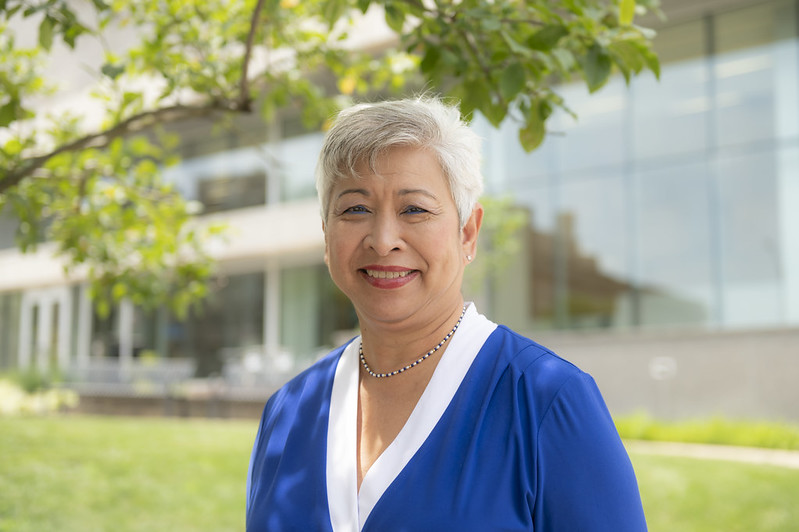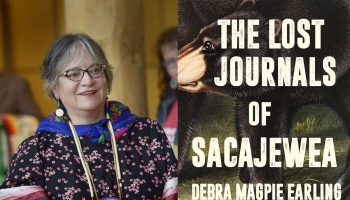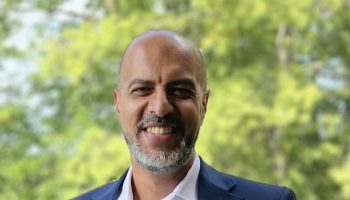
Deborah Trefts
Staff Writer
Communities have defended themselves against disease and enhanced their collective health since human civilization began. For any population, from a small group of people to the inhabitants of several continents, credible analysis of the determinants of
health and the threats confronted provides the basis for public health.
The science and practice of preventing disease, protecting and improving quality of life, and increasing life expectancy encompasses physical, psychological and social wellbeing. From problem recognition to resolution, multiple fields of expertise within the basic and applied sciences, social sciences and humanities are involved.
At 3 p.m. Saturday in the Hall of Philosophy, Maureen Lichtveld, M.D. — vice chair of the National Academy of Medicine Council in 2024 and a member of the academy since 2016 — will give the final lecture of the Chautauqua Women’s Club’s 2025 Contemporary Issues Forum.
Titled “Lessons from COVID, the Imminent Avian Bird Flu Threat, and the Certainty of Future Pandemics,” her talk will provide a candid assessment of the global health landscape. She “will examine what went wrong, what went right, and what we must do now to protect public health, strengthen resilience and navigate the challenges ahead.”
Lichtveld is dean of the School of Public Health, Professor of Environmental and Occupational Health, and the Jonas Salk Chair in Population Health at the University of Pittsburgh’s School of Public Health. Pitt was the public health school chosen in July 2024 to coordinate the new Pennsylvania One Health Consortium in order “to improve the health and wellbeing of humans, animals, plants and the environment,” and Lichtveld is leading this trans-disciplinary initiative and resource.
As a recent member of the board of directors of the Consortium of Universities for Global Health — established in 2008 with funding from the Bill & Melinda Gates Foundation and the Rockefeller Foundation “to improve the wellbeing of people and the health of our planet” — Lichtveld has the expertise and experience for this statewide role and responsibility.
“It’s important to see the role of the environment in all of our lives,” Lichtveld said. “If there’s an increase in ticks, there’s an increase in Lyme disease. If mosquitoes increase, dengue increases. It’s happening locally in Florida and Texas, and it’s coming up north.”
Environmental public health has been the chief focus of her work, particularly “environmentally induced disease, health disparities, environmental health policy, disaster preparedness, public health systems and community resilience.” Her “research examines the cumulative impact of chemical and nonchemical
stressors on communities facing environmental health threats, disasters, and health disparities.”
Lichtveld did not grow up yearning to be a renowned public health leader.
“My path is not what young kids think — that I want to be X and I become X,” she said. “I’m of mixed race. I’m from Suriname in northeastern South America (bordering the Atlantic Ocean). It’s a very ethnically mixed country. It was a Dutch colony (until Nov. 25, 1975). … In the Dutch system, you have to decide by age 12 what you want to become. (My choices were) science or medicine; I didn’t want to become a lawyer.”
In the Republic of Suriname, it takes eight years to get through medical school.
“I spent two months in a slaughter house, two months in the Bureau of Public Health, and four years in the interior, where I was the local coroner (there were deer hunting shootings),” Lichtveld said. By interior, she means the rainforest, which covers over 90% of Suriname.
“I did deliveries in canoes, in clay huts, and in animals,” she continued. “There were parasites; I was the local food handler. You have to be very hands-on because of tropical disease.”
After graduating in August 1981, at the age of 23, from the Faculty of Medicine at Anton de Kom University of Suriname (formerly Dutch Guyana) in Paramaribo, Suriname’s capital city, and the University of Leiden in the Netherlands (where she began her medical studies but spent less than a year), Lichtveld “wanted to serve those who are most vulnerable,” so she chose to work in Suriname’s interior.
“I was the first female and youngest physician to start (practicing medicine) in the Amazon rainforest,” she said.
From 1981 to 1985, Lichtveld served as manager of the Regional Health Care Center in Moengo, Suriname. She managed a “regional primary care center with five satellite clinics” that provided health care and public health services to 26,000 inhabitants. In planning, managing and evaluating “all healthcare service provided … (and) developed and implemented several public health programs on childhood immunization, adolescent health education, and prenatal care.”
Although Lichtveld ran outdoor clinics for 60 to 100 people, she said that she thought “ ‘Maybe I’m not doing enough.’ Then, after six months, it was clear to me. I saw the same people coming back with the same afflictions. … That was my first ‘a-ha moment.’ My second was that there were many STDs in men; contact tracing (was needed).”
She said her third a-ha moment “nailed” her career in public health. “The children with vaccine coverage were just 5%. There was no way to change this. I trained nuns and all the leaders in the villages. There were 26,000 people in the region. I brought vials of vaccines in Igloo boxes. (Vaccine coverage) went from 5% to 95%. That’s how I started in public health. I would never have envisioned a career without
a stethoscope.”
This decision led her to Baltimore, where in May 1986 she earned a Master of Public Health with a specialization in environmental health sciences at Johns Hopkins University’s School of Hygiene and Public Health.
Lichtveld then began a 20-year appointment as an adjunct assistant professor at Tulane University School of Public Health and Tropical Medicine in New Orleans, from 1986 to 2005.
From August 1987 to April 1999, she also worked in various roles for the Agency of Toxic Substances and Disease Registry, which was established in 1985 as an advisory, non-regulatory agency within the U.S. Department of Health and Human Services.
Starting as a medical officer/toxicologist in the Office of Health Assessment, she progressed to chairperson of the National Medical Waste Group, followed by senior medical officer, then assistant director for public health practice, chief biomedical officer for public health practice, director of the Division of Health Education and Promotion, and finally acting administrator of the agency. Her primary focus was designing “public health research tools and protocols to guide environmental health studies in communities located near hazardous waste sites.”
For the next four years, Lichtveld worked within the Centers for Disease Control and Prevention as the associate director for workforce development and director of the Office of Workforce Planning and Policy in CDC’s Public Health Practice Program. In “implementing the CDC/ATSDR National Public Health Workforce Development Strategic Plan, (she) combined biomedical, social, epidemiological, behavioral and policy data expertise to address issues of science, policy and public health practice.”
In April 2004, Lichtveld served as the senior health scientist within the Office of the Director of the CDC, and an adjunct associate professor at Georgia State University in Atlanta. As a member of the CDC Futures Initiative Public Health Research Working Group, she co-developed a “fast track” set of public health research priorities. For GSU’s nascent Master of Public Health program, she initiated a successful “proposal to build the first state of the art environmental health teaching and research laboratory.”
During the summer of 2005, Lichtveld was appointed a full professor, as well as the Freeport McMoRan Chair of Environmental Policy in the Department of Global Environmental Health Sciences at Tulane’s School of Public Health and Tropical Medicine. As part of her responsibilities, she “directed the Center for Gulf Coast Environmental Health Research, Leadership, and Strategic Initiatives … (and) led development and implementation of disaster management, health promotion and disease-prevention strategies for Gulf Coast communities.”
In addition, she served as the associate director for population sciences at the Tulane University Cancer Center. From 2011 to 2016, while Lichtveld was at Tulane, she was the director of the Research Consortium for Gulf Resilience on Women’s Health. According to Lichtveld, the consortium “was built on strong partnerships among communities with health disparities in the Gulf Coast region, frontline health practitioners and scientists engaged in transdisciplinary community-based participatory research.”
Funded by the National Institute of Environmental Health Sciences within the National Institutes of Health, this consortium examined “the impact on reproductive health and birth outcomes in women in the aftermath of the Gulf of Mexico oil spill” under her leadership.
In January 2021, Lichtveld assumed the leadership of Pitt’s School of Public Health, where she oversees “an academic community that spans seven academic departments, almost 1,200 students, 165 faculty and 320 staff, (and prepares) students to conduct research, practice and serve communities locally, nationally and globally.”
“There are people who take this as an administrative position,” she said. “I do not; I teach. I started the undergraduate program in public health … two years ago. It has grown from 50 to 117 to 200 some students. That’s 162% growth — the highest in the nation. This wasn’t done before. … Now we’ve got students not only into college, but also into public health, for college and master’s degree programs.”
Currently, Lichtveld is leading a study of the 2023 train derailment in East Palestine, Ohio. Twenty of the train cars affected in the incident contained hazardous materials. “People died, fish died, vegetables (were contaminated),” she said. “You can’t separate this into silos.”
Another “contribution as an expert volunteer is leading the health chapter” of the National Academies of Sciences, Engineering, and Medicine’s “Independent Study on Potential Environmental Effects of Nuclear War,” she said. In addition, with Barry Lee Johnson, Lichtveld co-authored the textbook Environmental Policy and Public Health (2022).
Of the numerous honors that she has received annually, the following demonstrate her breadth of knowledge and impact: the Agency for Toxic Substances and Disease Registry’s Environmental Health Scientist of the Year in 1990 and the registry’s Outstanding Science Award in 1996; and a Special Service Award for activities associated with the CDC Health Alert Network.
Other honors include being named Woman of the Year of the City of New Orleans for contributions to science, in 2013; chairing the American Journal of Public Health editorial board in 2015; joining the Johns Hopkins University Society of Scholars in 2016; delivering the 2019 commencement address for the Johns Hopkins University’s School of Nursing; serving as member of the National Academies of Sciences, Engineering, and Medicine’s Climate Security Roundtable in 2022; and serving as a member of the executive committee of the National Research Council in 2024.
“On a good day in public health, nothing happens,” Lichtveld said. “We haven’t seen a good day in a long time. … If you take care of the most vulnerable, you take care of everybody. … What we do globally, affects us locally. What we don’t do also impacts us.”
She continued, “For example, if you don’t eradicate mosquitoes in a developing country, they will literally bite us. It’s already happening. A mosquito doesn’t know a border. Neither does a virus. By helping globally, you are supporting your own health.”




